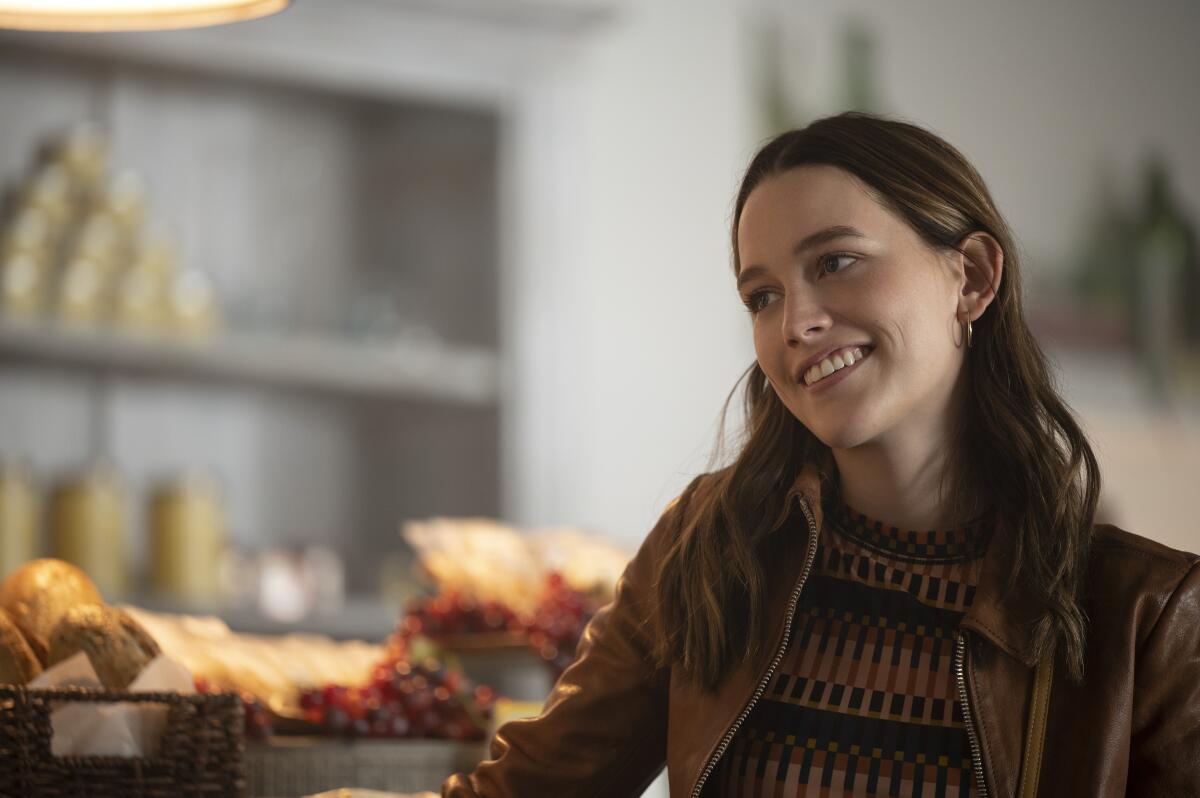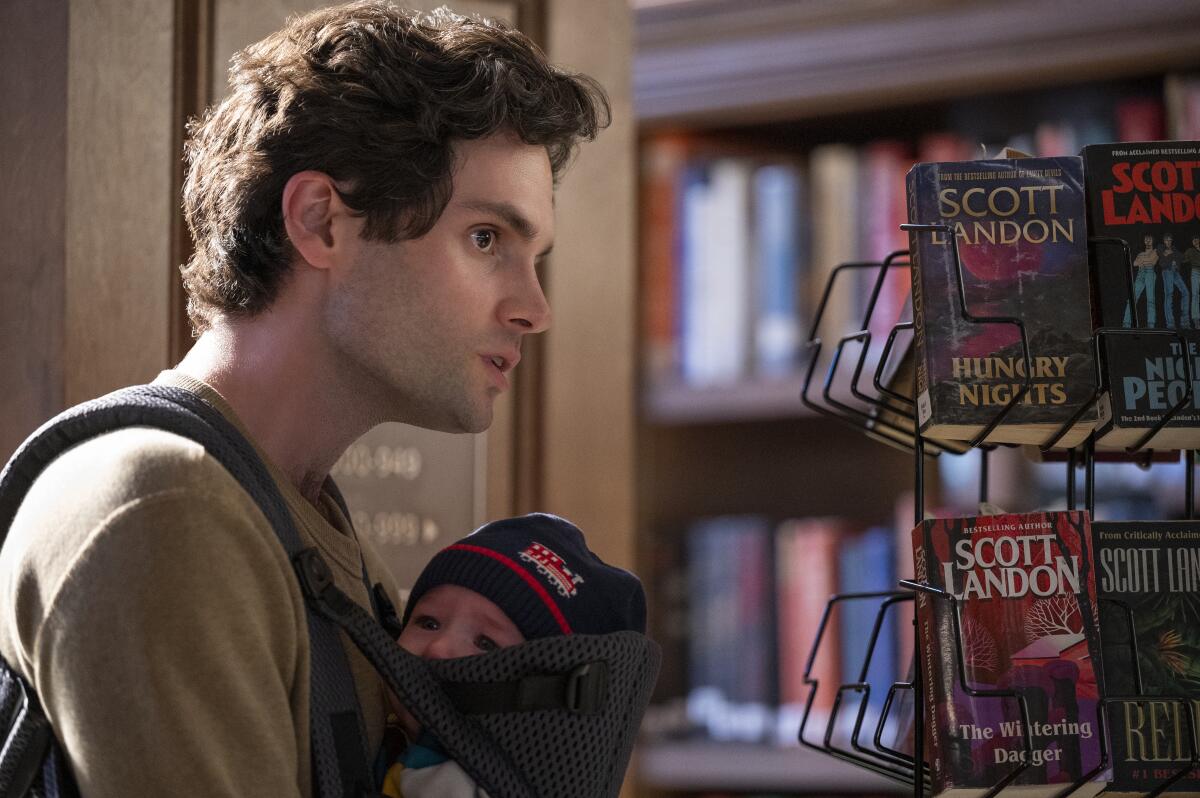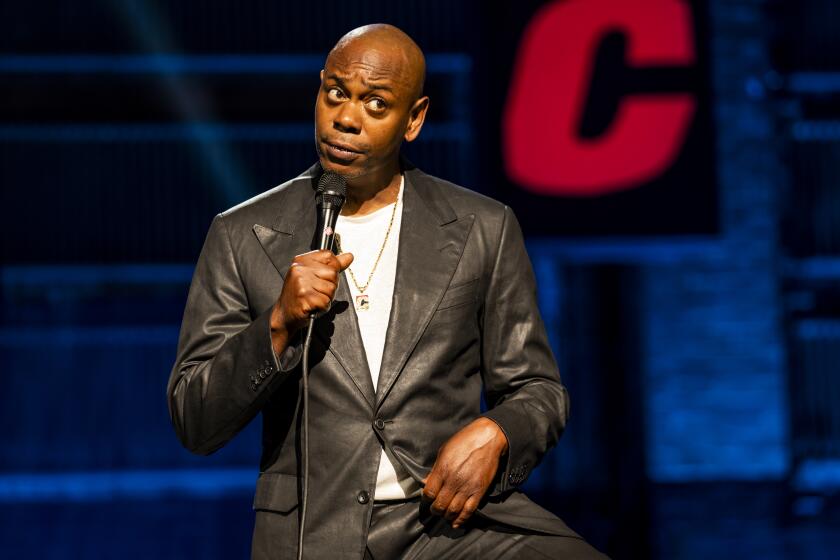A therapist explains how ‘You’ gets its characters’ twisted psychology right

- Share via
The following story contains major spoilers from the third season of “You.”
Love Quinn is not patient. She is not kind. She is full of envy. And she is quite easily angered. She is the opposite of society’s lyrical definitions of love.
But in the twisted world of “You,” Love’s warped understanding of love makes sense. Just like her husband, Joe Goldberg (Penn Badgley), Love (Victoria Pedretti) views intimate relationships through a distorted lens. We’re talking Salvador Dalí levels of distorted.
In Season 3 of the series, premiering today on Netflix, Love finds herself with everything she’s ever wanted. She’s married to the perfect guy, has an adorable son and is running a thriving bakery. But she’s deeply unhappy.
On the surface, Love and Joe do seem to be an ideal match. They are perfectionists who constantly seek validation from others. They have cultivated hobbies that they can escape into when they’re feeling stressed or anxious: Joe reads; Love bakes. They use brutal violence as a primary coping mechanism.
The complete guide to home viewing
Get Screen Gab for everything about the TV shows and streaming movies everyone’s talking about.
You may occasionally receive promotional content from the Los Angeles Times.
And they both have severe attachment disorders that stem from codependent relationships with toxic caretakers in early childhood. But these past relationships have shaped their respective definitions of what it means to love and be loved in very different ways.
From the start, Victoria Pedretti has portrayed Love with a whip-smart intellect, an intense presence and a hair-trigger temper. She so fully embodied the character that the many subtle warning behaviors she wove throughout Season 2 in no way ruined the surprise when we found out that Love, too, was a serial killer. The quickness with which Pedretti’s face slackens and her lips purse whenever Love is displeased is psychotic perfection. And the unbridled rage that burns in her eyes when she brandishes a murder weapon is unparalleled.
For all her physical tells, the key to Love is embedded in her relationship with her twin brother, Forty (James Scully). The twin connection between Forty and Love runs deep: They grew up with abusive and neglectful parents, so they clung to each other for support throughout childhood and into adulthood. But as the female sibling, Love was placed in the role of caretaker to Forty. A fierce protective instinct and total lack of parental guidance are what led her to kill at the tender age of 13 when she found out that the nanny was sexually abusing Forty. Of course, Forty eventually dies, and Love blames herself for not being able to prevent it from happening.

When we finally get a chance to hear Love’s inner monologue in the episode “W.O.M.B,” it’s revealed that she’s talking to the ghost of her dead brother. She’s texting him, in fact. Instead of talking to some random, idealized person as Joe does, Love’s inner voice is guided by someone she truly loved. Sure, her relationship with Forty was supremely flawed, but at least it was rooted in trust and mutual understanding.
Love reaches out to Forty as she heads to their mother’s W.O.M.B — Summit, that is. The conference ostensibly celebrates women who “do it all,” but really it’s just nine circles of woman-shaming hell disguised as a luxury spa weekend.
Throughout the weekend, Love keeps tapping out anxiety-ridden texts, trying to figure out where it all went wrong. She kicks off a missive to her brother by wondering why she cheated on Joe with the teenaged neighbor. (This one’s obvious. Theo is basically Forty.) First, she blames herself. She’s grabbed the golden ring and reached happily ever after. But why isn’t she happy? What can she do to change?
Season 2 of ‘You,’ on Netflix, shifts the action to Los Angeles — and sends up a number of stereotypes about the city along the way.
As Love’s inner monologue unspools, we get a tantalizing glimpse at the workings of her mind. It’s full of shame, regret and second guesses. Later, when she drunkenly hallucinates Forty in her bathtub, they spend a lot of time discussing how she needs to try and make her life with Joe work, even though “he makes me feel bad for being me.” Love has been taught — by both society and her family — that it is her fault when a relationship isn’t going right. So instead of hitting the eject button with Joe, she decides to dig in.
To be fair, Love isn’t the perfect partner to Joe, either. She murders Natalie in cold blood, impulsively whacks anti-vaxxer Gil on the head and engages in a reckless affair with Natalie’s stepson. But at least she tries to find ways to keep her marriage afloat. (Ahem. She’s also supporting them financially.) Joe is content to activate his relationship parachute and find another empty obsession; Love is committed until death do they part.
It’s no surprise that the death part doesn’t take long. This is “You,” after all. As Love makes an ill-fated bid to save her marriage, her inner monologue appears one final time. Only now she’s talking directly to Joe.
As Joe lies on the floor, paralyzed by Love’s poison, there’s no need for her to hide the truth anymore, so she can monologue out loud. Encouraged by a comment from Marienne, Joe’s newest flavor of the month, Love finally decides to listen to the little voice inside her. It’s telling her that she can’t save this marriage; she needs to get rid of Joe to be free.
In Screen Gab No. 9, we explore the history behind the Dave Chappelle controversy, refresh your ‘Succession’ memory and recommend streaming thrillers.
It’s too bad Joe feels the same way about Love.
As Joe stabs Love with a syringe filled with her very own poison, she utters some of the most haunting final words in TV history: “We’re perfect for each other, but bad for Henry. He’ll know what you are.” With her final breath, she damns him to a life without Love.
“You” will never be the same without her. In fact, she was such an indelible character that it’s easy to imagine an alternate universe in which she emerged triumphant at the end of Season 3, and Joe either died or did some much-deserved time behind bars. Love’s death illustrates that “You” has always been interested in interrogating toxic portrayals of love — and was never going to give anyone a true chance at happily ever after.
Qualey is a licensed therapist specializing in addiction and trauma with more than a decade of experience in the field. She also works as a freelance writer, often focusing on the intersections between mental health, addiction and pop culture.
‘You’
Where: Netflix
When: Any time
Rating: TV-MA (may be unsuitable for children under the age of 17)
More to Read
The complete guide to home viewing
Get Screen Gab for everything about the TV shows and streaming movies everyone’s talking about.
You may occasionally receive promotional content from the Los Angeles Times.







